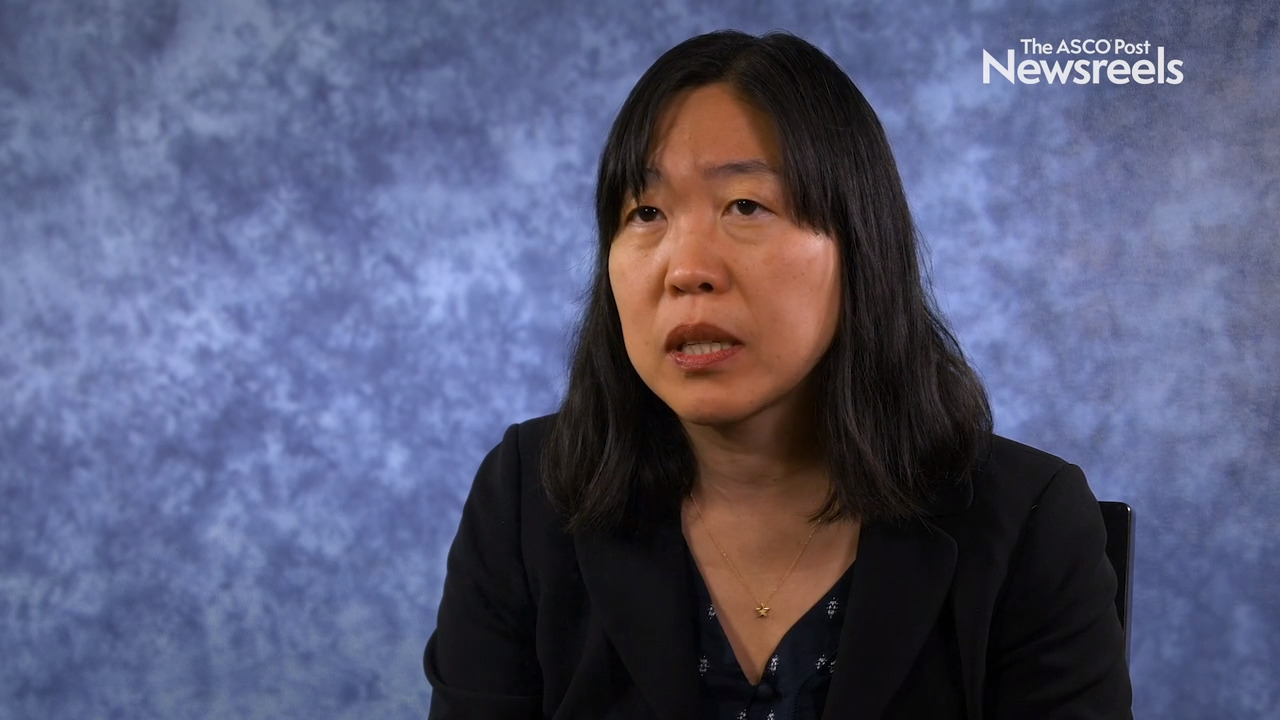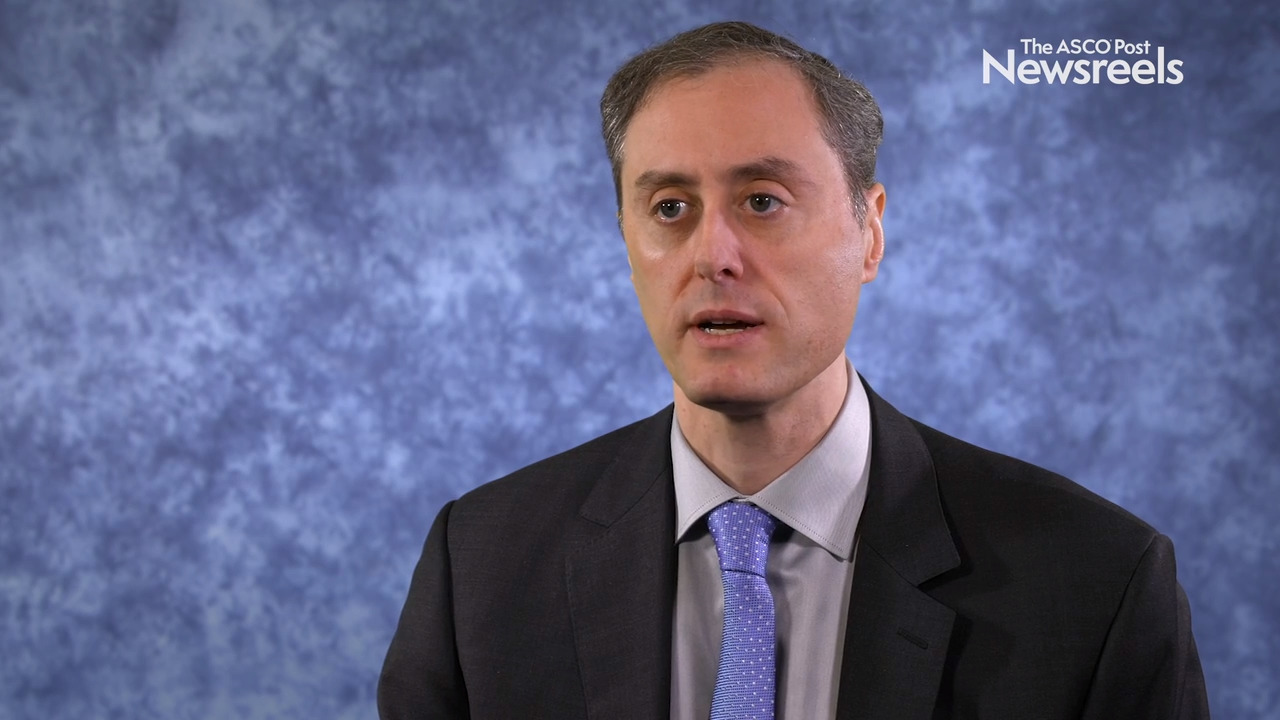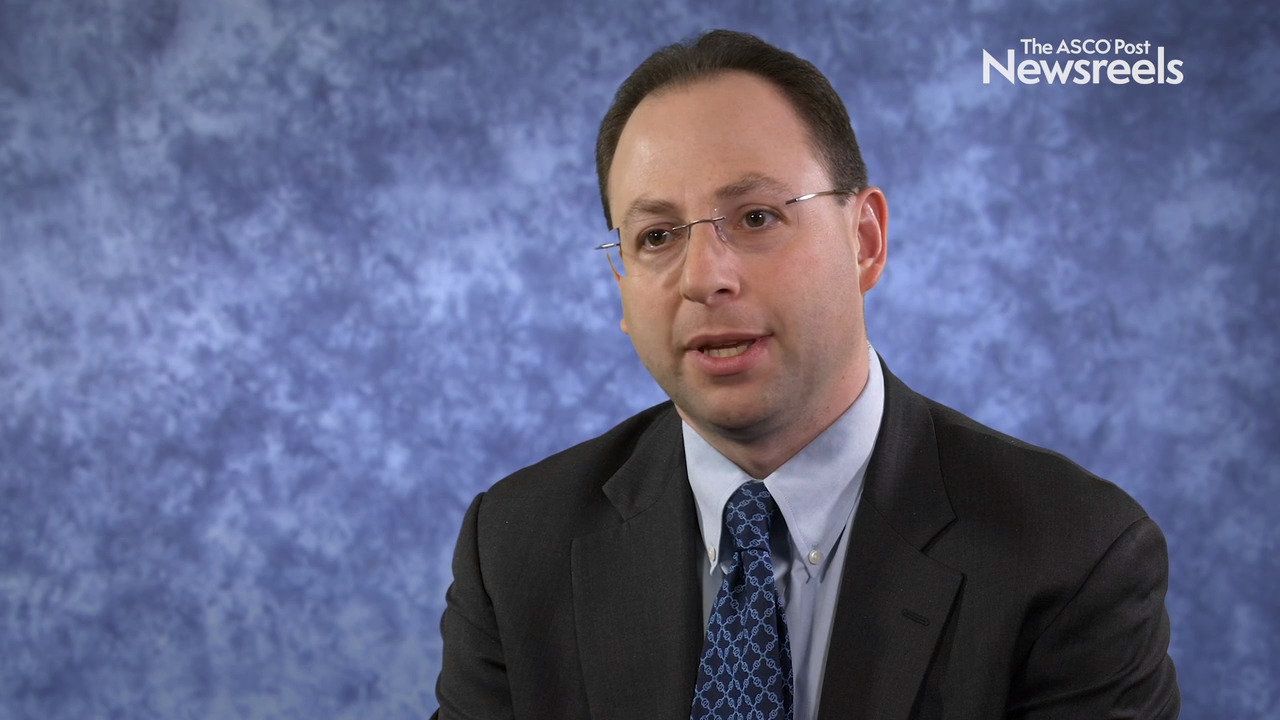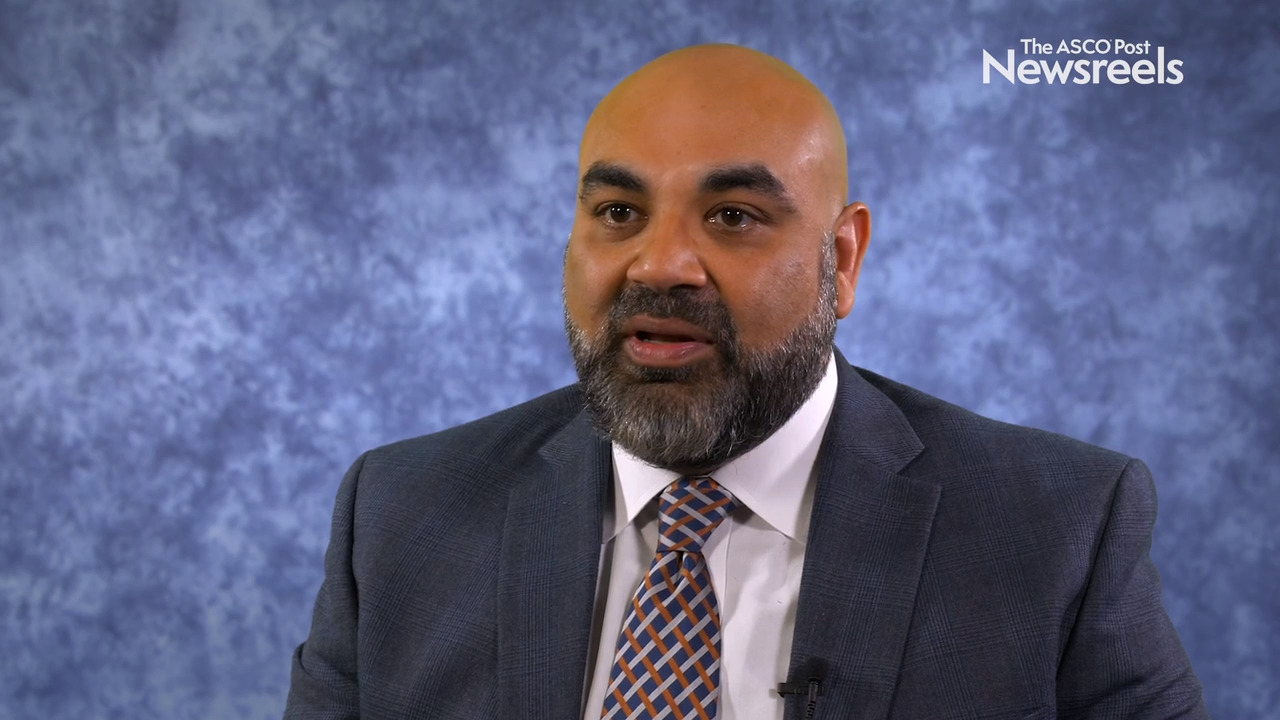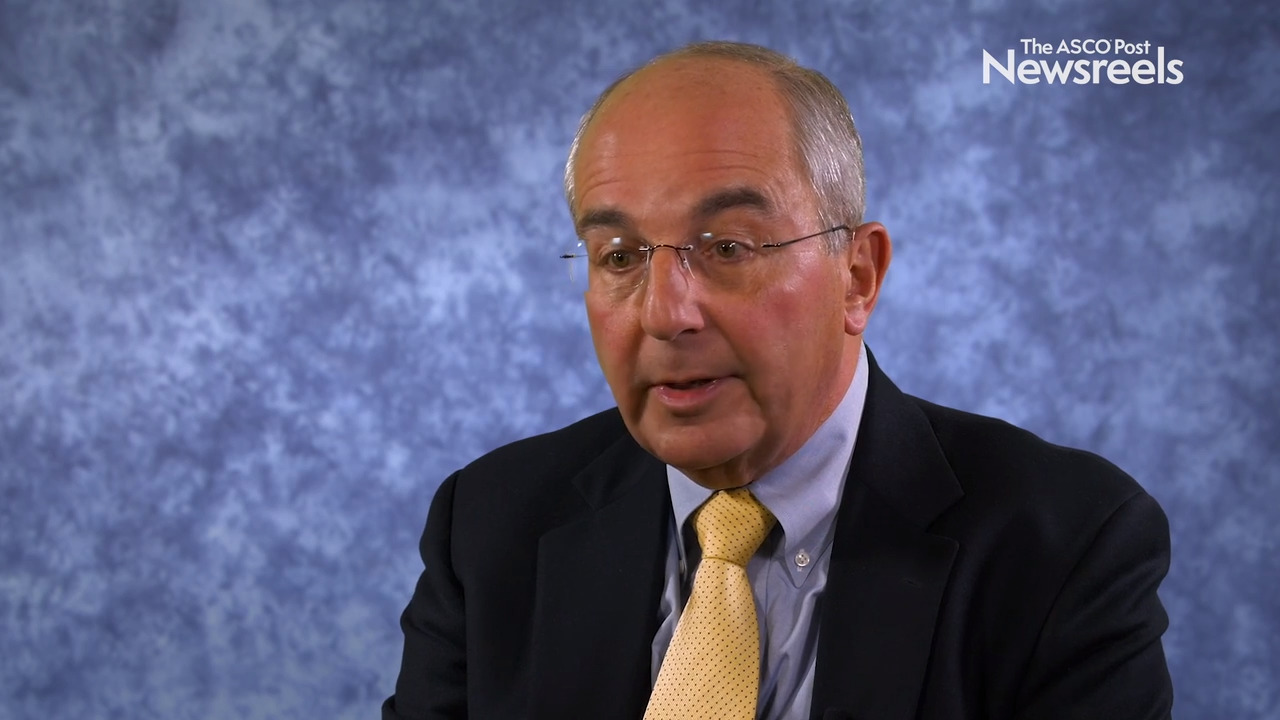Nivolumab/Ipilimumab Shows Benefit in Patients With Non–Small Cell Lung Cancer and Brain Metastases
The combination of nivolumab plus ipilimumab was at least as effective as chemotherapy in front-line therapy for patients with advanced non–small cell lung cancer (NSCLC) and brain metastases at baseline, according to the results of a post hoc analysis from part 1 of the phase III CheckMate 227...
Facing Death and Appreciating Life
I have had to come to terms with my own mortality three times in my life and I’m only 46. When I was 17, I was diagnosed with end-stage renal disease and experienced renal failure 2 years later. I underwent my first kidney transplant at 21, just before starting medical school. Finally, I thought my ...
Number of Hospitalizations May Be an Important Indicator of Survival for Patients With Head and Neck Cancer
Patients who were unexpectedly hospitalized for dehydration, fever, or other events while undergoing radiotherapy for head and neck cancer were at a higher risk for less favorable outcomes, according to a study published by Anurag K. Singh, MD, and colleagues in Oral Oncology. Researchers found...
Christopher Nutting, MD, PhD, on Head and Neck Cancer: Dysphagia-Optimized vs Standard IMRT
Christopher Nutting, MD, PhD, of the Royal Marsden Hospital and Institute of Cancer Research, discusses phase III results from the first study to demonstrate the functional benefit of swallow-sparing intensity-modulated radiotherapy in oro- and hypopharyngeal cancers (Abstract 6508).
FDA Approves Nine-Valent HPV Vaccine for the Prevention of Certain HPV-Related Head and Neck Cancers
On June 12, Merck announced that the U.S. Food and Drug Administration (FDA) had approved an expanded indication for Gardasil 9—a human papillomavirus (HPV) nine-valent vaccine—for the prevention of oropharyngeal and other head and neck cancers caused by HPV types 16, 18, 31, 33, 45, 52, and 58....
Pembrolizumab Plus Chemoradiotherapy for Locally Advanced Head and Neck Squamous Cell Carcinoma
In a phase Ib study reported in the Journal of Clinical Oncology, Powell et al found that the addition of pembrolizumab to curative chemoradiotherapy was safe and associated with response in patients with locally advanced head and neck squamous cell carcinoma. Study Details The U.S. multicenter...
Selpercatinib for Lung and Thyroid Cancers With RET Gene Mutations or Fusions
On may 8, 2020, selpercatinib was granted accelerated approval for the following indications: Adult patients with metastatic RET fusion-positive non–small cell lung cancer (NSCLC) Adult and pediatric patients ≥ 12 years of age with advanced or metastatic RET-mutant medullary thyroid cancer who...
Transoral Resection Followed by Low-Dose Radiation for Some Oropharyngeal Cancers
The final results of the randomized phase II ECOG-ACRIN E3311 trial were presented by Robert L. Ferris, MD, PhD, and colleagues during the ASCO20 Virtual Scientific Program (Abstract 6500) and in today's Head and Neck Cancer Oral Abstract Session. The trial, conducted in patients undergoing...
New ASCO Guideline Addresses Head/Neck Squamous Cell Carcinoma of Unknown Primary
ASCO has released a new clinical guideline titled, “Diagnosis and Management of Squamous Cell Carcinoma of Unknown Primary in the Head and Neck: ASCO Guideline.”1 The guideline, promulgated by an international expert panel, is intended to “provide evidence-based recommendations to practicing...
Pam Baker DeGuzman, PhD, on Assessing Distress During Telemedicine Visits With Rural Survivors of Head and Neck Cancer
Pam Baker DeGuzman, PhD, of the University of Virginia School of Nursing, discusses her study findings on the use of the NCCN Distress Thermometer, which identified and addressed distress in patients treated for head and neck cancer who were then referred to speech pathologists, lymphedema specialists, and social workers (Abstract HSR20-082).
Better Mental Health Screening Needed for Survivors of Head and Neck Cancer
The threat posed by head and neck cancer extends well beyond the physical disease, according to research presented at the 2020 Multidisciplinary Head and Neck Cancers Symposium.1,2 The pair of studies underscored the high costs of survivorship, including elevated rates of chronic pain, substance...
Study Finds Chemoradiation Plus Bevacizumab Safe and Feasible in Locally or Regionally Advanced Nasopharyngeal Cancer
The addition of bevacizumab to the current standard of care of chemoradiation therapy is safe and feasible for the treatment of locally or regionally advanced nasopharyngeal cancer, according to data presented at the 2020 Multidisciplinary Head and Neck Cancers Symposium.1 “I’m pleased to report...
Expert Point of View: Charu Aggarwal, MD, MPH
Charu Aggarwal, MD, MPH, Leslye M. Heisler Assistant Professor for Lung Cancer Excellence at the Perelman Center for Advanced Medicine, University of Pennsylvania, underscored the paucity of treatment options for metastatic head and neck squamous cell carcinoma. “Even though pembrolizumab is...
Pembrolizumab Plus Cetuximab Shows Antitumor Activity in Squamous Cell Head and Neck Cancer
The first trial to evaluate anti–programmed cell death protein 1 (PD-1) blockade combined with epidermal growth factor receptor (EGFR) inhibition in head and neck squamous cell carcinoma demonstrates promising activity of the drug combination in patients with platinum-refractory or -ineligible...
Expert Point of View: Sue Sun Yom, MD, PhD
Sue Sun Yom, MD, PhD, Professor of Radiation Oncology & Otolaryngology–Head and Neck Surgery at the University of California, San Francisco, Helen Diller Family Comprehensive Cancer Center, said there is “reasonableness to further investigation” of the combination of programmed cell death...
Pembrolizumab Plus Radiotherapy Worthy of Further Study in Locally Advanced Squamous Cell Head and Neck Cancer
The combination of the checkpoint inhibitor pembrolizumab and definitive radiation therapy appears to be a safe and feasible option for patients with locally advanced head and neck cancer who are not eligible for cisplatin, according to data presented at the 2020 Multidisciplinary Head and Neck...
Expert Point of View: Tanguy Y. Seiwert, MD
Moderator of the session, Tanguy Y. Seiwert, MD, Director of the Head and Neck Cancer Oncology Disease Group and Assistant Professor of Oncology at Johns Hopkins University, in Baltimore, underscored the “dramatically good” preclinical data supporting the use of mTOR inhibitors in advanced...
Study Suggests Adjuvant Everolimus May Benefit Patients With Advanced Head and Neck Cancer
The mTOR inhibitor everolimus, used to treat breast and kidney cancers, may benefit patients with advanced squamous cell carcinoma of the head and neck, according to data presented at the 2020 Multidisciplinary Head and Neck Cancers Symposium.1 The results of an investigator-initiated, phase II...
Expert Point of View: Tanguy Y. Seiwert, MD
Tanguy Y. Seiwert, MD, moderator of the session on the phase II trial of neoadjuvant nivolumab with or without ipilimumab in patients with oral cavity cancer, underscored concerns about differences in outcome measures. Dr. Seiwert is Director of the Head and Neck Cancer Oncology Disease Group and...
Phase II Trial Finds Neoadjuvant Immunotherapy Feasible in Oral Cavity Cancer
The results of a phase II study suggest that a short course of immunotherapy prior to surgery for oral cavity cancer may trigger tumor regression, possibly providing long-term benefits for patients. According to data presented at the 2020 Multidisciplinary Head and Neck Cancers Symposium,1 a 3-week ...
Immune-Restorative Agent May Boost Immunotherapy Response in Advanced Head and Neck Cancer
Immune modulation with checkpoint inhibitors has shown beneficial effects in advanced head and neck squamous cell carcinoma, but responses have been limited to a small number of patients. According to data presented at the 2020 Multidisciplinary Head and Neck Cancers Symposium, however, an...
Expert Point of View: Sue Sun Yom, MD, PhD
Sue Sun Yom, MD, PhD, Professor of Radiation Oncology & Otolaryngology–Head and Neck Surgery at the University of California, San Francisco, Helen Diller Family Comprehensive Cancer Center, said there is “reasonableness to further investigation” of the combination of programmed cell death...
Pembrolizumab Plus Radiotherapy Worthy of Further Study in Locally Advanced Squamous Cell Head and Neck Cancer
The combination of the checkpoint inhibitor pembrolizumab and definitive radiation therapy appears to be a safe and feasible option for patients with locally advanced head and neck cancer who are not eligible for cisplatin, according to data presented at the 2020 Multidisciplinary Head and Neck...
Sue Sun Yom, MD, PhD, on HPV-Associated Oropharyngeal Cancer: Challenges in De-intensifying Radiation Therapy
Sue Sun Yom, MD, PhD, of the University of California, San Francisco, talks about the variety of evolving ways to deintensify radiation therapy, the critical need to counsel patients on the risks and benefits, and the ethical importance of respecting patient preferences in choosing their cancer therapies.
Jared Weiss, MD, on Squamous Cell Carcinoma of the Head and Neck: When Standard Therapy is Contraindicated
Jared Weiss, MD, of the University of North Carolina, Chapel Hill, discusses outcomes for patients with stage III or IV disease who are ineligible for the standard treatment of cisplatin plus radiotherapy. His data suggest that treatment with pembrolizumab/radiotherapy instead is tolerable, with improvements seen in progression-free and overall survival (Abstract LBA1).
Jonathan D. Schoenfeld, MD, MPH, on Oral Cavity Cancer: Neoadjuvant Nivolumab With or Without Ipilimumab
Jonathan D. Schoenfeld, MD, MPH, of Dana-Farber Cancer Institute and Brigham and Women’s Hospital, discusses phase II study results with the PD-1 inhibitor nivolumab or the combination of PD-1/CTLA-4 inhibition with nivolumab/ipilimumab in patients with newly diagnosed untreated oral cavity cancer (Abstract 1).
Gopal K. Bajaj, MD, MBA, on Reducing Opioid Use in Patients With Head and Neck Cancer Undergoing Radiotherapy
Gopal K. Bajaj, MD, MBA, of the Inova Schar Cancer Institute, discusses the results of a small study that showed prophylactic gabapentin can be safely and effectively used to significantly reduce pain and the use of opioids in patients undergoing radiotherapy or chemoradiotherapy for head and neck squamous cell carcinoma.
David Adelstein, MD, on Guidelines for Treating HPV-Associated Oropharyngeal Squamous Cell Carcinoma
David Adelstein, MD, of the Cleveland Clinic, discusses the hypothesis that treatment can be de-intensified in patients with HPV-associated oropharyngeal cancer and a good prognosis.
Jill Gilbert, MD, on HPV-Associated Oropharyngeal Cancer: Challenges in De-intensifying Systemic Therapies
Jill Gilbert, MD, of Vanderbilt University Medical Center, discusses this ongoing area of investigation and which patients can safely undergo a de-intensification of treatment. Based on two randomized trials, cetuximab should not be substituted for cisplatin as a de-intensification strategy in HPV-positive oropharyngeal cancer.
Assuntina G. Sacco, MD, on Head and Neck Squamous Cell Carcinoma: Trial Results on Pembrolizumab and Cetuximab
Assuntina G. Sacco, MD, of the University of California, San Diego, discusses the results of a small phase II study, which suggest that pembrolizumab plus cetuximab may show activity for platinum-refractory/-ineligible patients with recurrent or metastatic head and neck squamous cell carcinoma (Abstract 15).
Nadeem Riaz, MD, on Established and Emerging Biomarkers for Immunotherapy in Head and Neck Cancer
Nadeem Riaz, MD, of Memorial Sloan Kettering Cancer Center, discusses the biomarkers that have emerged for immunotherapy and their tumor microenvironments, from PD-L1 staining and the Combined Positive Score to next-generation genomic technologies.
Carryn M. Anderson, MD, on Reducing Severe Oral Mucositis and Its Effect on Patient Outcomes
Carryn M. Anderson, MD, of the University of Iowa Hospital, discusses the investigational agent GC4419, previously shown to be safe and effective in decreasing the duration, incidence, and severity of oral mucositis in patients receiving concurrent cisplatin and radiation for oral cavity and oropharyngeal squamous cancers. The 2-year tumor outcome data suggest that GC4419 does not seem to compromise tumor control (Abstract LBA2).
Francis P. Worden, MD, on the Role of Induction Chemotherapy in Laryngeal Preservation
Francis P. Worden, MD, of the University of Michigan Health System Comprehensive Cancer Center, explores the use of novel biomarkers that may help predict response to induction chemotherapy and survival in patients with locally advanced laryngeal cancer.
FDA Pipeline: Priority Review in Lung Cancer, Breakthrough Therapy Designation in Head and Neck Cancer, and More
This week, the U.S. Food and Drug Administration (FDA) granted Priority Review to brigatinib for the treatment of ALK-positive lung cancer and Breakthrough Therapy designation to a potential first-in-class oral antagonist of inhibitors of apoptosis proteins for the treatment of head and neck...
2020 Head and Neck Cancers Symposium: Immune Restorative Agent May Boost Immunotherapy Response in Advanced Head and Neck Cancer
Immune modulation with checkpoint inhibitors has shown benefit in advanced head and neck squamous cell carcinoma, but responses have been limited to a small number of patients. According to data presented by Gregory T. Wolf, MD, FACS, Professor Emeritus in the Department of Otolaryngology-Head and...
2020 Head and Neck Cancers Symposium: Adjuvant Everolimus for Advanced Head and Neck Cancer
The mTOR inhibitor everolimus may extend progression-free survival for patients with advanced head and neck cancer who are at high risk for recurrence after standard treatment. Patients enrolled in a randomized phase II trial who received the agent were more likely to be cancer-free 1 year after...
2020 Head and Neck Cancers Symposium: Nivolumab With or Without Ipilimumab for the Neoadjuvant Treatment of Patients With Oral Cavity Cancer
Results from a new clinical trial suggest that neoadjuvant immunotherapy for oral cavity cancers may elicit tumor regression, which could provide long-term benefit for patients. Findings were presented by Jonathan D. Schoenfeld, MD, MPH, of Dana-Farber/Brigham and Women's Cancer Center, and...
2020 Head and Neck Cancers Symposium: Pembrolizumab Plus Radiotherapy for Platinum-Ineligible Patients With Locally Advanced HNSCC
A new phase II trial has found that the combination of radiation therapy and pembrolizumab led to improved survival outcomes and acceptable toxicity for patients with locally advanced head and neck squamous cell carcinoma (HNSCC). The combination therapy may offer a new treatment option for...
FDA Pipeline: Priority Reviews in Lung Cancers, Lymphoma
This week, the U.S. Food and Drug Administration (FDA) granted Priority Review to treatments for non–small cell and small cell lung cancers, as well as for diffuse large-B cell lymphoma (DLBCL); Breakthrough Therapy designation to an antibody-drug conjugate for bladder cancer; and a double Fast...
FDA Pipeline: Priority Reviews in Lymphoma, Lung Cancer, GIST, and Breast Cancer
This week, the U.S. Food and Drug Administration (FDA) granted Priority Review to agents in lymphoma, lung cancer, gastrointestinal stromal tumors, and breast cancer, and granted Fast Track designation to a first-in-class radioenhancer hafnium oxide nanoparticle in head and neck cancer. Priority...
Plasma Circulating Tumor HPV DNA for the Detection of Recurrent HPV-Associated Oropharyngeal Cancer
In a study reported in the Journal of Clinical Oncology, Bhishamjit S. Chera, MD, and colleagues found that surveillance for circulating tumor human papillomavirus (HPV) DNA was accurate in identifying disease recurrence in patients with curatively treated HPV-associated oropharyngeal squamous cell ...
Do Socioeconomic Factors Play a Role in Outcomes for HPV-Positive Head and Neck Cancer?
Survival outcomes for patients with human papillomavirus (HPV)-positive squamous cell carcinoma of the head and neck have made significant gains in recent years, but new research published by Pike et al in JNCCN—Journal of the National Comprehensive Cancer Network has found some groups have not...
Gabapentin and Methadone for Patients Undergoing Treatment of Head and Neck Cancer
With nearly all patients who undergo treatment for cancer of the head and neck experiencing oral mucositis, effective pain control is one of the main goals of physicians and care teams. Looking to provide more effective relief for patients—while also reducing the need for opioid painkillers—a team...
Patients With HPV-Positive and HPV-Negative Oropharyngeal Cancer May Have Different Rates of Mortality
New research indicates that there is a higher risk of early death among patients with oropharyngeal cancer not associated with human papillomavirus (HPV) vs those whose tumors are HPV-positive. The findings are published by Fullerton et al in Cancer. The incidence of oropharyngeal cancer is...
T-DM1 Shows Activity in HER2-Amplified Salivary Gland Cancer in Small Patient Sample of NCI-MATCH
The antibody-drug conjugate ado-trastuzumab emtansine (T-DM1) showed activity in HER2-amplified salivary gland tumors, according to data published by Jhaveri et al in Annals of Oncology. The publication is for ‘Arm Q,’ which is one of nearly 40 single-arm phase II treatments in the NCI-Molecular...
Saliva Test May Play A Role in the Early Detection of HPV-Related Oropharyngeal Cancer
A report by Wang et al in The Journal of Molecular Diagnostics described the use of acoustofluidics, a noninvasive method that analyzes saliva for the presence of human papillomavirus type 16 (HPV-16), the pathogenic strain of the disease associated with oropharyngeal cancers. This novel technique...
Pembrolizumab vs Cetuximab Plus Chemotherapy in Recurrent or Metastatic Head/Neck Squamous Cell Cancer
As reported in The Lancet by Barbara Burtness, MD, of the Department of Medicine, Yale University School of Medicine, and colleagues, the phase III KEYNOTE-048 trial has shown improved overall survival with first-line pembrolizumab plus chemotherapy vs cetuximab plus chemotherapy among patients...
FDA Pipeline: Priority Reviews in SCLC, Bladder Cancer, Colorectal Cancer
Recently, the U.S. Food and Drug Administration (FDA) granted Priority Reviews for treatments in extensive-stage small cell lung cancer (SCLC), non–muscle invasive bladder cancer, and BRAF V600E–mutant colorectal cancer. The Agency also recently issued multiple Breakthrough Therapy designations and ...
Acupuncture May Reduce Radiation-Induced Dry Mouth for Patients With Head and Neck Cancer
After receiving acupuncture treatment 3 days a week during the course of radiation treatment, patients with head and neck cancer experienced less dry mouth, according to study results published by Garcia et al in JAMA Network Open. The results are from the first randomized, placebo-controlled,...
Early Research Shows Potential New Targets in Treating Glioblastoma, Colorectal Cancer, and Pancreatic Ductal Adenocarcinoma
Glioblastoma multiforme, colorectal cancer, and pancreatic ductal adenocarcinoma represent some of the most difficult-to-treat cancers and collectively cause more than 114,000 deaths each year in the United States. A trio of recently published basic research studies in these cancers have found...


